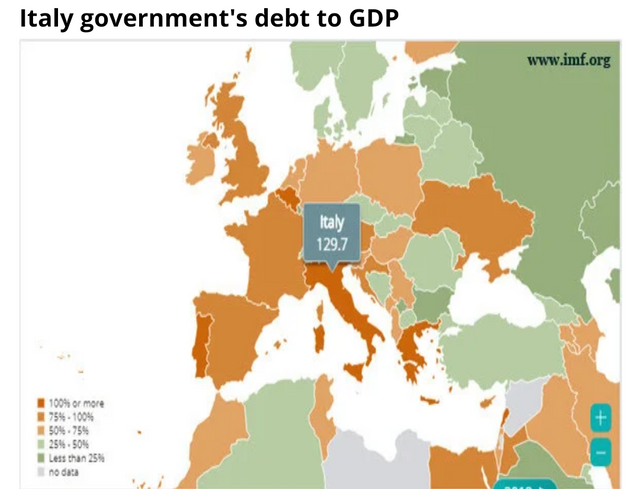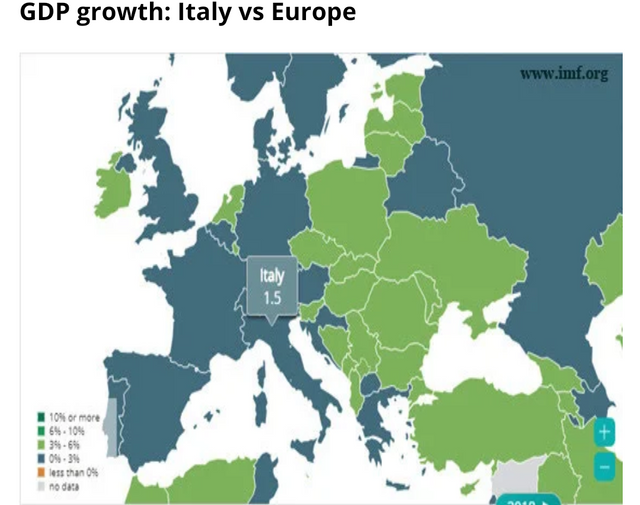Why Italy is suddenly giving markets such a big headache?
NEW DELHI: Remember PIIGS – an acronym for the debt-ridden southern European economies of Portugal, Italy, Greece and Spain, and Ireland?
Or the Scottish referendum of 2014 or Brexit of 2016?
Euro zone has just returned to haunt financial markets again. A political crisis in Italy is threatening to blow out, and how!
In many European countries, there are groups that just do not want to stay with the European Union, thanks to the austerity measures they have been forced upon by the EU for years to keep their economies from defaulting. One of its impacts has been widespread unemployment and anger among public.
Italy’s unemployment hit 11 per cent when it went to vote this past March. Despite all austerity measures, its debt still stood at a whopping $2.3 trillion, more than its annual GDP. There is a belief among sections that staying with the EU may leave them nowhere.

The political chaos is obvious. The third largest euro zone economy produced a hung Parliament; anti-EU parties became popular but fell short of a majority. An attempt to form a coalition by two such parties has been thwarted. With re-elections likely, the euro bloc stares at uncertainty ahead.
What’s happening?
Italians voted on March 4 but none of the three major parties won a majority. Earlier this month, two of them – Five Star Movement and League – joined hands to form a coalition government and proposed a law professor, Giuseppe Conte, as prime minister.
But Italian President Sergio Mattarella blocked the move, triggering fresh political turmoil.
Mattarella didn’t favour the idea of making economist Paolo Savona, known for his anti-German and anti-euro rhetorics, the new finance minister. So he exercised his right as President to veto these appointments under the debatable Article 92.
The law gives the President the right to appoint the president of the council of ministers and, on his proposal, the ministers.
As expected, the collation government did not like the idea and prime minister-designate Conte gave up, making a case for re-election as early as July. A former IMF official Carlo Cottarelli, known for his role in public spending cuts in the past, has been tasked to form an interim government. This may bring further public anger.
League is euro-sceptic and believes in anti-globalisation. Five Star Movement, too, is critical of the European Union. The two parties received overwhelming votes in March elections. Some believed a re-election may turn into a de-facto Italian referendum.

Impact on stocks, bonds
The political uncertainty in Italy has pushed Italian bond yields higher, meaning cost of borrowing for the nation is going to rise. In Spain, prime minister Mariano Rajoy would face a no-confidence vote on Friday. Bond yields in that country too has jumped .
The developments have hurt the euro and pushed the dollar index, which pegs the greenback against six major world currencies (with euro having the biggest weightage), to the highest level since July 6, 2017.
This index is said to have inverse relationship with equities. Such developments will make US-denominated assets safe and attractive. Already, India has been witnessing a steady outflow for over a month now. If the developments in Italy were to intensify, they would surely hurt your equity returns going ahead.
Congratulations @amyra! You have completed some achievement on Steemit and have been rewarded with new badge(s) :
Click on any badge to view your Board of Honor.
For more information about SteemitBoard, click here
If you no longer want to receive notifications, reply to this comment with the word
STOPDo not miss the last announcement from @steemitboard!